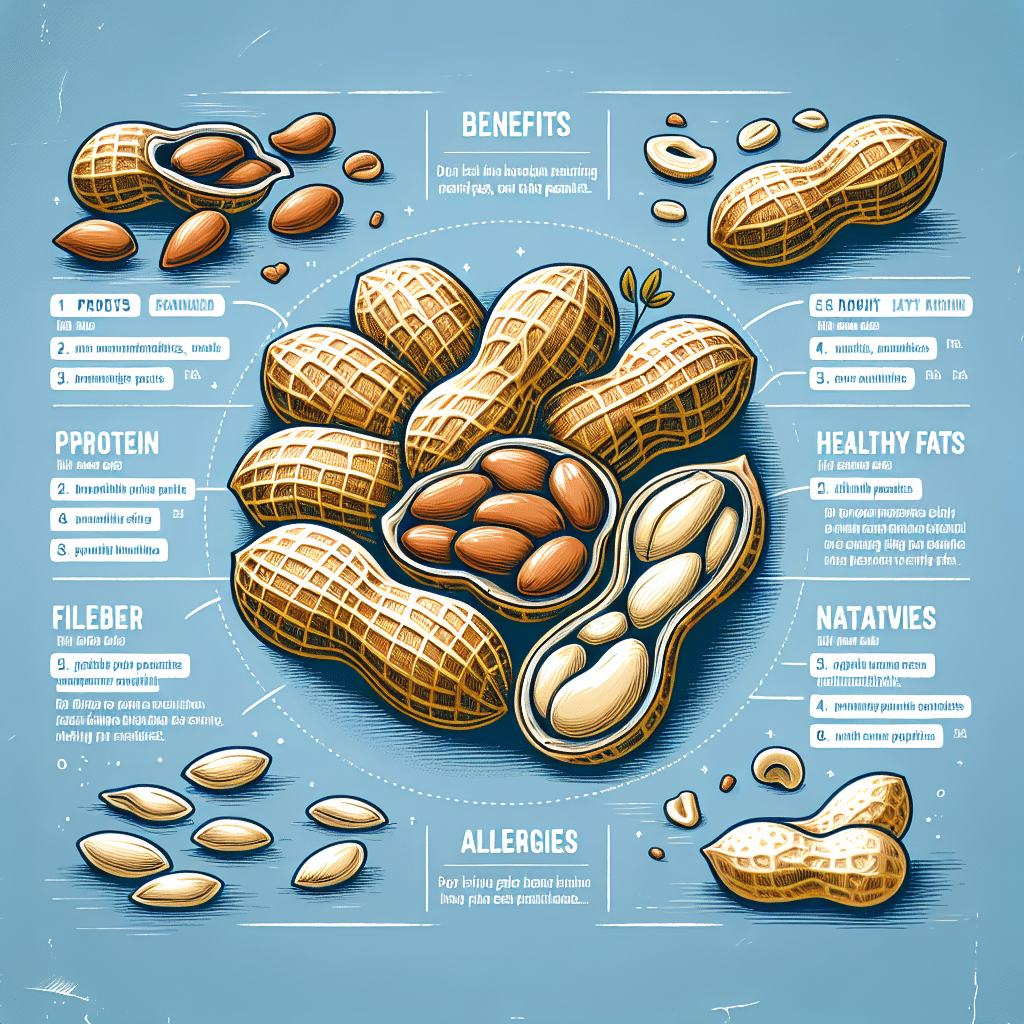Are Peanuts Good Or Bad For You?
-
Table of Contents
Peanuts: Nutritional Powerhouse or Health Hazard?

Peanuts are a common snack enjoyed by millions worldwide, but their impact on health has been a topic of debate among nutritionists and health enthusiasts. Are peanuts a nutritious addition to your diet, or should they be consumed with caution? This article delves into the nutritional profile of peanuts, their health benefits, potential risks, and how they fit into a balanced diet.
The Nutritional Profile of Peanuts
Peanuts, despite their name, are not true nuts but legumes, related to beans and lentils. They are a rich source of various nutrients that are essential for maintaining good health. Here’s a breakdown of what peanuts have to offer:
- Protein: Peanuts are an excellent source of plant-based protein, making them a great option for vegetarians and vegans.
- Healthy Fats: They contain monounsaturated and polyunsaturated fats, which are beneficial for heart health.
- Fiber: Peanuts are high in dietary fiber, which aids in digestion and promotes satiety.
- Vitamins and Minerals: They are rich in vitamins like B-vitamins and minerals such as magnesium, phosphorus, potassium, and zinc.
- Antioxidants: Peanuts contain antioxidants like resveratrol, which can help combat oxidative stress in the body.
Health Benefits of Peanuts
Regular consumption of peanuts has been associated with several health benefits:
- Heart Health: The healthy fats in peanuts can lower bad cholesterol levels, reducing the risk of heart disease.
- Weight Management: Peanuts have a high satiety value, which can help in controlling appetite and managing weight.
- Diabetes Control: The low glycemic index of peanuts makes them a good snack for people with diabetes, helping to regulate blood sugar levels.
- Reduced Risk of Gallstones: Studies have shown that regular peanut consumption may lower the risk of gallstone formation.
- Anti-Aging Benefits: The antioxidants in peanuts can help protect the skin from free radical damage.
Potential Risks and Considerations
While peanuts have many health benefits, there are also potential risks to consider:
- Allergies: Peanut allergies are one of the most common and severe food allergies, which can lead to life-threatening reactions.
- Aflatoxins: Peanuts can be contaminated with aflatoxins, harmful compounds produced by certain molds, which are linked to liver cancer.
- Caloric Density: Peanuts are high in calories, and overconsumption can lead to weight gain.
How to Include Peanuts in Your Diet
Incorporating peanuts into your diet can be done in a variety of ways:
- As a snack, either raw or roasted.
- Incorporated into stir-fries or salads for added crunch.
- As peanut butter spread on whole-grain toast or added to smoothies.
- Used in sauces and marinades to add flavor and thickness.
It’s important to choose unsalted, unflavored varieties to avoid excess sodium and sugars. Also, moderation is key to reaping the benefits without overindulging in calories.
Conclusion: Balancing the Good with the Bad
Peanuts can be a nutritious addition to a balanced diet when consumed in moderation. They offer a wealth of nutrients and health benefits, from heart health to weight management. However, it’s crucial to be mindful of the potential risks, especially for those with peanut allergies or a tendency to overeat high-calorie foods. By understanding both the good and the bad, you can make informed decisions about including peanuts in your diet.
Enhance Your Diet with ETprotein’s Quality Protein Products
If you’re looking to incorporate more plant-based proteins into your diet, ETprotein offers a range of high-quality protein products. Their peanut protein is an excellent way to enjoy the benefits of peanuts in a convenient, versatile form. ETprotein’s commitment to non-GMO, allergen-free products with high purity ensures that you’re getting the best nutrition for your health needs. Whether you’re a fitness enthusiast, managing your weight, or simply seeking to improve your overall health, ETprotein’s protein offerings can support your goals.
About ETprotein:
ETprotein, a reputable protein and L-(+)-Ergothioneine (EGT) Chinese factory manufacturer and supplier, is renowned for producing, stocking, exporting, and delivering the highest quality organic bulk vegan proteins and L-(+)-Ergothioneine. They include Organic rice protein, clear rice protein, pea protein, clear pea protein, watermelon seed protein, pumpkin seed protein, sunflower seed protein, mung bean protein, peanut protein, and L-(+)-Ergothioneine EGT Pharmaceutical grade, L-(+)-Ergothioneine EGT food grade, L-(+)-Ergothioneine EGT cosmetic grade, L-(+)-Ergothioneine EGT reference grade and L-(+)-Ergothioneine EGT standard. Their offerings, characterized by a neutral taste, non-GMO, allergen-free attributes, with L-(+)-Ergothioneine purity over 98%, 99%, cater to a diverse range of industries. They serve nutraceutical, pharmaceutical, cosmeceutical, veterinary, as well as food and beverage finished product distributors, traders, and manufacturers across Europe, USA, Canada, Australia, Thailand, Japan, Korea, Brazil, and Chile, among others.
ETprotein specialization includes exporting and delivering tailor-made protein powder and finished nutritional supplements. Their extensive product range covers sectors like Food and Beverage, Sports Nutrition, Weight Management, Dietary Supplements, Health and Wellness Products, and Infant Formula, ensuring comprehensive solutions to meet all your protein needs.
As a trusted company by leading global food and beverage brands and Fortune 500 companies, ETprotein reinforces China’s reputation in the global arena. For more information or to sample their products, please contact them and email sales(at)ETprotein.com today.














